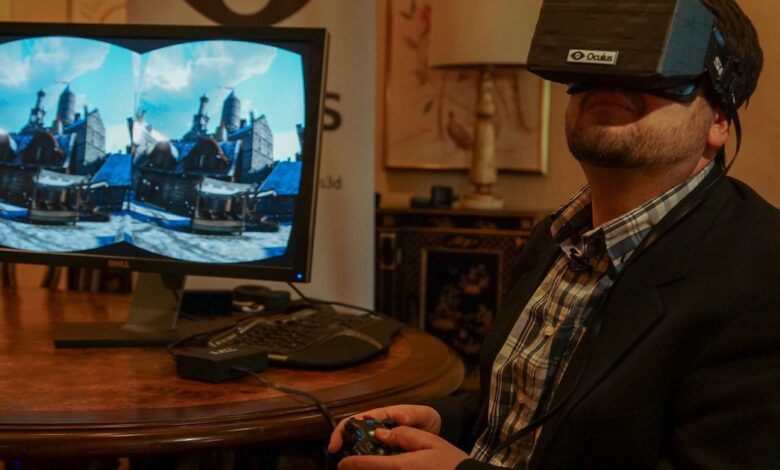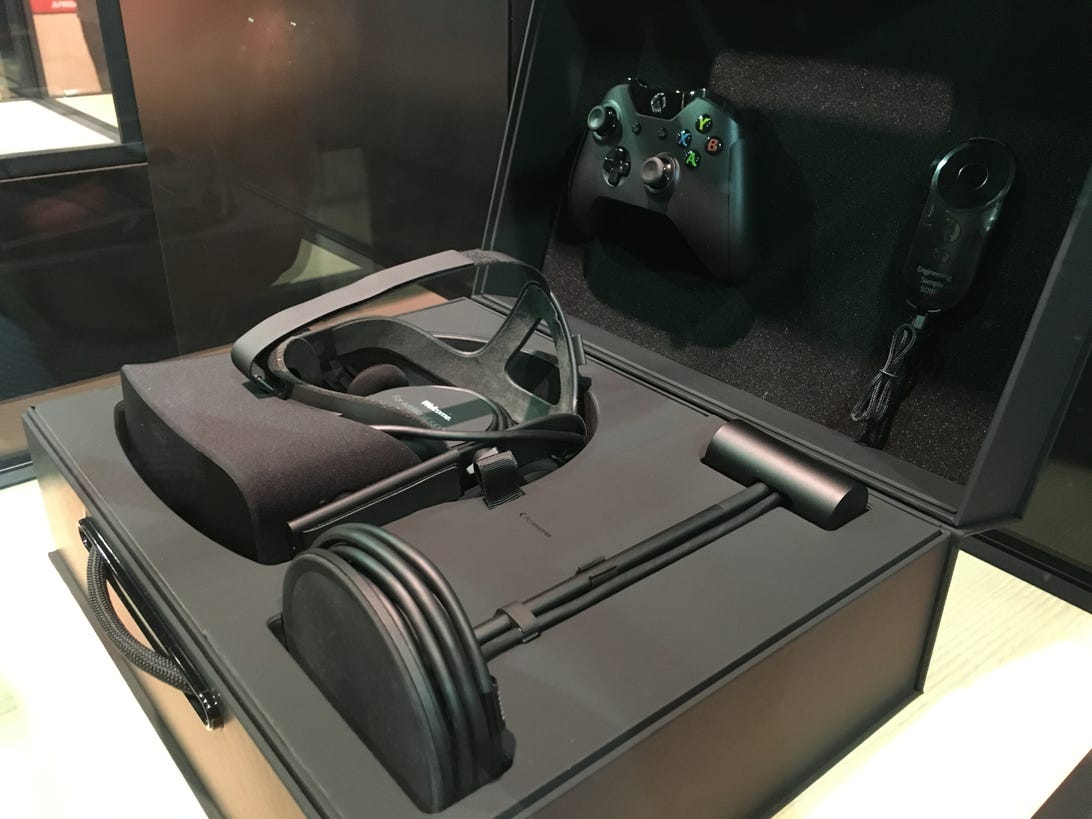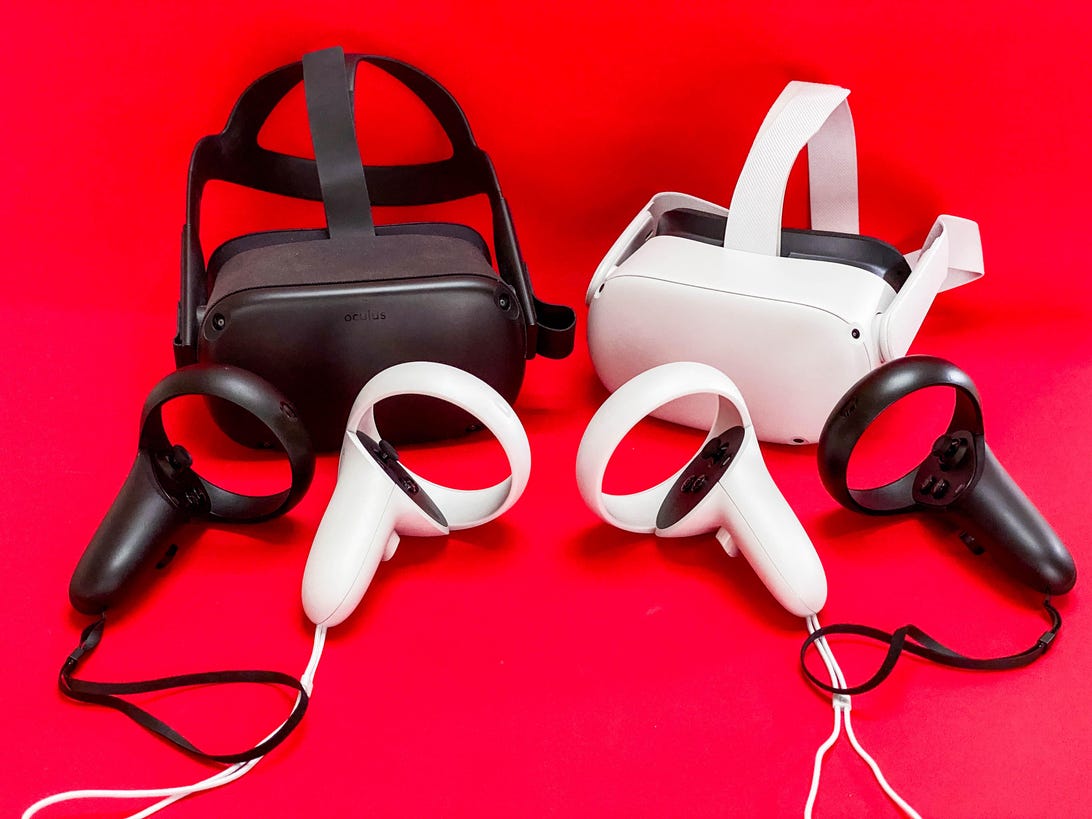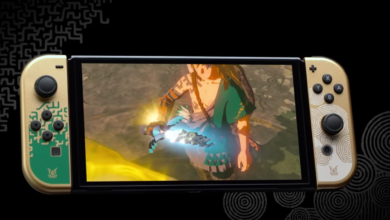Oculus Rift, five years on: Things are a lot different now

[ad_1]
Trying out the Oculus Rift in a CES hotel room in Las Vegas, in 2013. It was amazing even then.
Josh Lowensohn/CNET
Believe it or not, it’s been five years since VR seemed like the technology of the future. But then, it’s always seemed like the technology of the future. In the 1990s, I read about metaverses and tried VR in mall arcades. Then, in 2013 in a hotel room in Las Vegas, I was blown away by a demo of VR on my face that made me think our VR dreams were suddenly so much closer than we realized. (Several other CNET editors demoed it back then, too: check out Geoffrey Morrison’s impressions.)
When the Oculus Rift went on sale in 2016, it had already been available as a developer kit for some years. There were also VR goggles for phones, made by Samsung and Google, that had been everywhere for well over a year. VR was flooding the market. Sony had the PlayStation VR arriving in the fall. Valve and HTC had holodeck-like VR available in the HTC Vive at the exact same time that the Rift debuted.
This week marks five years since the Rift went on sale, but what I’m saying is that VR existed before that, and it kept reinventing itself after that. I’ve never been a big PC gaming guy. Plugging the Rift into a big rig computer with a bunch of wires was certainly cyberpunk, but not the free-form immersion I wanted. The Samsung Gear VR’s form, tiny and self-contained and powered off just a phone, felt more like the future.
Phone VR back then didn’t do much, though. You could only turn your head around and point and click with a small, simple remote control. If you wanted to reach out and grab things, duck and weave and walk in a full spatially mapped world, you needed that full PC.
Windows PCs, with SteamVR and the Oculus Store, were the bleeding edge of where interesting new apps emerged. Many of those games, like Job Simulator, are still classics today. But PCs also welcomed a sort of open, DIY brand of VR future, with indie developers, programs you could easily load in yourself and PCs you could customize.

What the first Oculus Rift came with: headset, camera sensor… and an Xbox controller.
Scott Stein/CNET
PC VR is still here, but the future is entirely different now. My dream of the fusion of phone VR and PC VR has already happened with the Oculus Quest, which points to where small, self-contained devices will head. VR now, and AR glasses next. When I tried the final retail version of the Rift in 2016, which only had a basic Xbox One controller in the box to control it with, I imagined a wide open future that was tethered down to bulky gear. Now, it’s something I can pop on my face in a few seconds. If I showed my 2016 self the Oculus Quest 2, which arrived late last year, I would have lost my mind.
But the five-year anniversary of the Oculus Rift is also the death of the Oculus Rift. Parent company Facebook is ending its PC headset hardware run, choosing only the Quest 2 as the VR device of the future. The Quest works with PCs using a USB-C cable, but it also has an operating system and app store that’s closed off and curated by Facebook. And it requires a Facebook login — the full Facebook-ification of Oculus has arrived. And the company’s end goal is still in flux: Expect future headsets to keep leaning towards always-on AR glasses than the VR headsets we’re seeing now.

The Oculus Quest and Quest 2: all self-contained.
Scott Stein/CNET
Those who dreamed of that early VR future that Palmer Luckey championed are no doubt pissed. Others may fear what Facebook has in store for its immersive platforms. Right now, the Quest 2 is a stellar device, a perfected version of what the Rift was trying to be. But at what cost? I still think it’s the best gadget I’ve used in years, and the Oculus Rift demos were the most memorable experiences I’ve had covering tech over the past 15 years.
With Sony readying a new PSVR, Qualcomm and Microsoft evolving mixed reality, and Google, Apple and others waiting in the wings, what will Facebook do to co-exist with those worlds? We just don’t yet know.
And after a year of the pandemic, in which the world became almost entirely virtual and VR suddenly became more relevant than ever, it still wasn’t ready to be the tool for everyone. But it also started becoming a lot more interesting to a lot more people who had never considered it before.
I’ll be reflecting more on the Rift later this week with a look back on the reviews we did five years ago. I’ll be remembering what the future felt like then, and considering what we’d like it to be tomorrow.
[ad_2]
Source link






